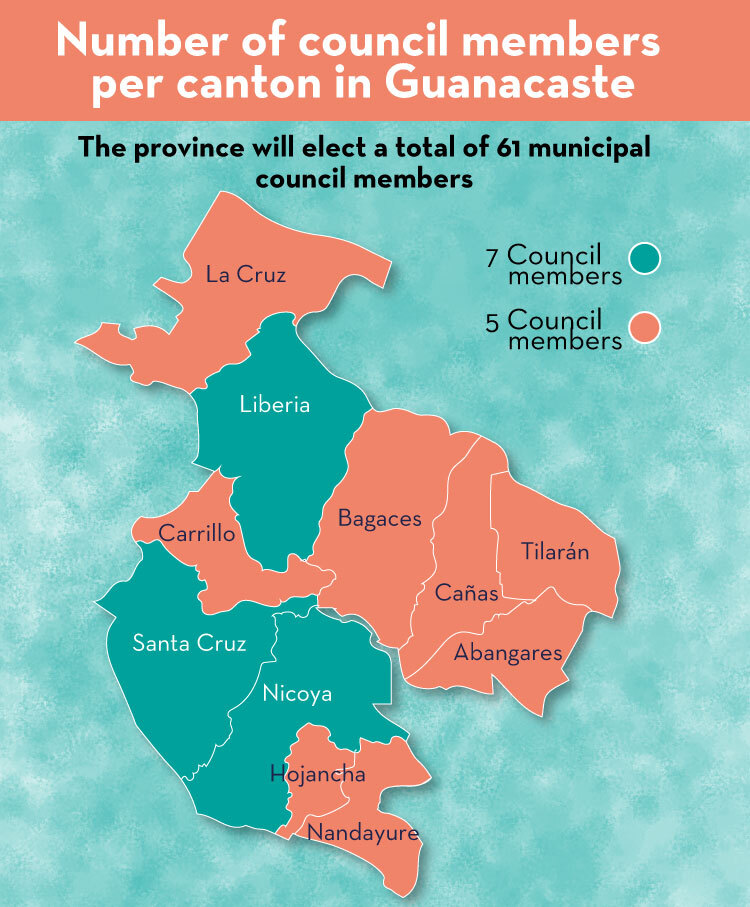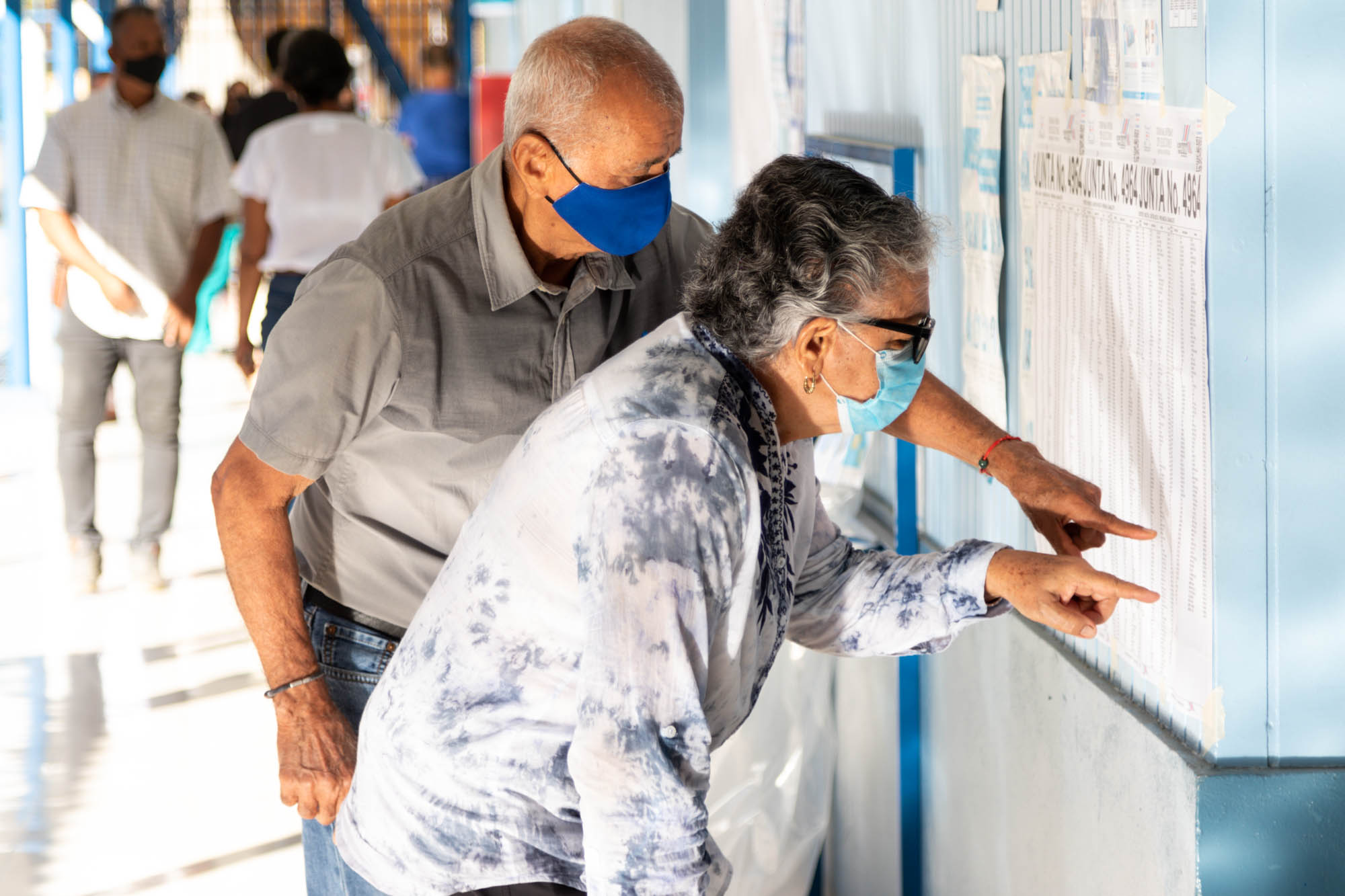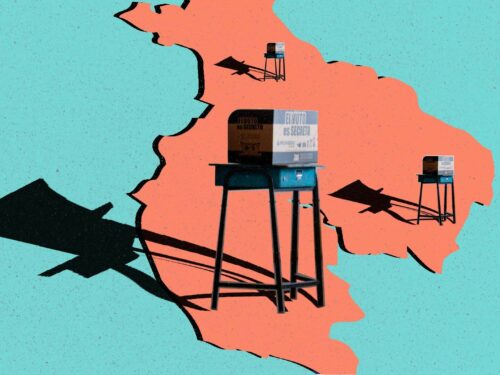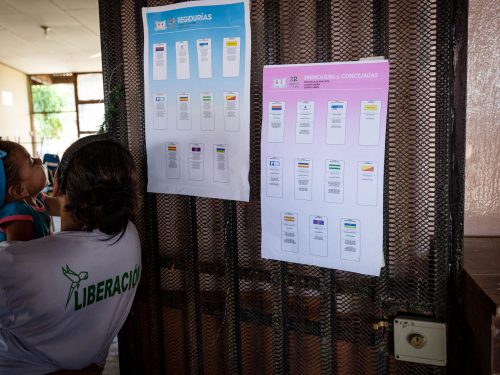
This Sunday, February 4, 6,212 local representatives will be elected in 84 cantons in the country: mayors, vice mayors, municipal council members, syndics (district representatives), district council members and administrators who will take office from 2024 to 2028.
For these elections, there are 268,431 registered voters in Guanacaste, 17,868 more voters than in the last municipal elections in 2020, according to data from the Supreme Electoral Tribunal (Spanish acronym: TSE).
The Voice of Guanacaste prepared a series of questions and answers to better understand the electoral process and the functions of the municipalities.
- How many ballots will we be given on election day and what do we choose on each one?
There are three ballots: on the first one, we vote for the candidate for mayor and their vice mayors, on the second one, for the political party of the council members and on the third one, for the syndics and district council members.
In the province, there is only one municipal district council, that of Colorado de Abangares. In that community, voters receive an additional ballot to vote for the district administrator.
- How are mayors, municipal council members, syndics and district council members elected?
The mayoral candidates and syndics with the most votes win. If there is a tie, the position is won by the one who is oldest, according to the Municipal Code.
In the case of municipal and district council members, the TSE applies a formula to determine who will hold those positions. (On page 15 of this link, you can see a more detailed explanation of the process in Spanish.)
- If I have a disability, am elderly or require assistance, will someone help me cast my vote?
Yes. With the aim of facilitating secret voting for people with disabilities or senior citizens, the TSE will have magnifying glasses, a mobile screen, crayons with covers, cards with illustrations and texts to guide deaf people. They will also have braille templates, guides for signing the registry and non-slip pads to hold the ballot.
If you find it difficult to vote alone, you’ll have the following alternatives:
- Public vote: The president of the vote receiving board will mark the ballots for you.
- Assisted voting: You’ll be able to enter the secret voting room accompanied by one person you trust, who must be Costa Rican and a legal adult. Your companion will mark the ballots in the way that you indicate.
If you have a visual impairment, you can be accompanied by your service dog. The vote receiving boards and the National Body of Delegates will ensure compliance with this provision.
Remember that voting is your right. Don’t hesitate to ask for help if you need it!
- If my vote is null or left blank, does it get added to anyone’s tally?
No. Null or blank votes are invalid, so they are simply excluded.
Guanacaste is the province where the most people exercise their right to vote in municipal elections and, as a result, where abstentionism is lower.
- If I am Costa Rican but I live abroad, can I vote?
No, those residing outside of the country can only vote in presidential elections and national referendums.
- How do I know where I am registered?
To find out where to vote, you can send a text message to 1020 including your ID number. In addition, you can consult this link or check the preliminary lists of voters that the TSE posts in each community in public places, shopping centers or community sites in your area.
- Where can I see who is running in each canton?
This link will take you to TSE’s official website, which specifies the candidates in each canton of the country.
- How long does it take to know the results of the municipal elections?
The TSE releases preliminary results after the polls close (6 p.m.) and will update the data in the hours that follow.
- When do elected candidates take office?
Wednesday, May 1, 2024 is the inauguration day for popular election positions at the municipal level.
- What is the municipal council and who is on it?
The municipal council is the deliberative body of each local government, something like the “legislative assembly.” It is made up of the regular council members and their alternates and the syndics.
The number of council members per canton depends on the size of the population. For example:
- Cantons with less than 1% of the country’s population elect five.
- Cantons with at least 1% but less than 2% of the country’s total population elect seven.
- Those with at least 2% but less than 4% of the population choose nine.
- Cantons with at least 4% but less than 8% choose 11.
- Cantons with 8% or more elect 13.
In Guanacaste’s case, we elect 122 council members: 7 regular council members and 7 alternates in Liberia, Nicoya and Santa Cruz, while Bagaces, Carrillo, Abangares, Tilarán, Nandayure, La Cruz and Hojancha will vote to elect 5 regular council members and 5 alternates.

- What role do syndics and council members play?
District councils are composed of syndics and district council members. Syndics are the people we elect to represent our district within the municipal council. They do not vote on council resolutions, but they do have a voice. In other words, they are the ones who propose projects to the municipal council to use part of the public resources in their communities.
- How are functions divided between the Municipal Council and the mayor’s office?
Together, the municipal council and the mayor’s office make up the municipal government. The council is the deliberative body (which makes decisions analyzing the pros and cons) and the mayor’s office is the administrative-executive branch.
insertar nota relacionada: No solo la alcaldía importa
The functions of the municipal councils (that is to say, the municipal council members) are similar to those of the Legislative Assembly but at a local canton level. And the same goes for the mayor’s office, which provides general administration for the municipality. To give an example, the mayor’s office or administration prepares the budget that details what the resources of the canton will be spent on, but it is the council that approves it, rejects it or requests changes.
Editor’s note: This article is based on one previously published by The Voice of Guanacaste for the 2020 elections, written by Noelia Esquivel S. y Andrea Rodríguez V. All of the information was corroborated, updated and we added specific data for this election day.







Comments